Review of ‘Aid, Conflict and Peace: Collaborative Research Symposium’
A report by Rebecca Viney-Wood, PhD student HCRI
All photos owned by Rebecca Viney-Wood, PhD student HCRI
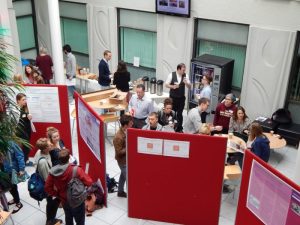 On Friday 19 May, the Humanitarian and Conflict Response Institute were privileged to host the ‘Aid, Conflict and Peace: Collaborative Research Symposium’. This student-led symposium presented innovative research from multiple perspectives, and provided a constructive and respectful environment for emerging and established academics to showcase their ideas. As Dr Eleanor Davey summarised on the day, “[the panellists have] come up with some fantastic new ways of looking at what can seem like intractable or perpetual problems”.
On Friday 19 May, the Humanitarian and Conflict Response Institute were privileged to host the ‘Aid, Conflict and Peace: Collaborative Research Symposium’. This student-led symposium presented innovative research from multiple perspectives, and provided a constructive and respectful environment for emerging and established academics to showcase their ideas. As Dr Eleanor Davey summarised on the day, “[the panellists have] come up with some fantastic new ways of looking at what can seem like intractable or perpetual problems”.
The conference was organised by HCRI PhD researchers Dr Louise Tomkow (MD) and Brigid Atterton, who were assisted by Dr Eleanor Davey and Stephanie Rinaldi, from HCRI. The organisers brought together researchers and students from across the University of Manchester and beyond with a shared interest in issues such as humanitarianism, conflict response and development. This one day event consisted of four panels, a poster competition, and a keynote speech given by speciality registrar in public health and MSF worker David Flecknoe.
The panels
The first panel broadly discussed the themes of violence and the individual. Rosanne Anholt came all the way from Vrije Universiteit Amsterdam to speak about her PhD research into governing (in)security through resilience. Rosanne argued that the neo-liberal emphasis on individual responsibility has changed understandings of resilience. Medical student Jessica McCaughey followed this with an analysis of rape in conflict, in which she addressed the limitations of international and national law to address this phenomenon. Finally, medical practitioner Lyndsey Kent shared her research exploring post-traumatic growth in female survivors of political violence in Chile.
The second panel moved discussion from the individual to the state, particularly addressing the presence and absence of state power. HCRI alumni and current medical student James Robb gave an interesting breakdown of Cuban medical internationalism, arguing that the use of medicine in Cuban foreign policy has transitioned from the implementation of an ideology to the commodification of doctors. Quint Hoekstra from the Department of Politics gave an insight into his PhD research project on state support for rebel groups, and how this may affect the outcome of contemporary conflicts.
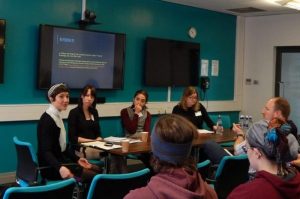 HCRI PhD student Jenny Chapman followed this with an illuminating overview of British medical responses to the 1998 famine in Sudan, drawing attention to changing understandings of famine in the humanitarian sector. In the final talk of the panel Medecins du Monde (MDM) Nurse Rosanna Glazik brought the focus back to contemporary humanitarianism. Rosanna offered fascinating first hand insight into healthcare provided to refugee by MDM on Greek ferries prior to the 2016 EU-Turkey Joint Action Plan.
HCRI PhD student Jenny Chapman followed this with an illuminating overview of British medical responses to the 1998 famine in Sudan, drawing attention to changing understandings of famine in the humanitarian sector. In the final talk of the panel Medecins du Monde (MDM) Nurse Rosanna Glazik brought the focus back to contemporary humanitarianism. Rosanna offered fascinating first hand insight into healthcare provided to refugee by MDM on Greek ferries prior to the 2016 EU-Turkey Joint Action Plan.
Humanitarianism and peace at home were the focus of the third panel, beginning with HCRI MA student Amy Wisenfelds’ account of UK foodbanks. Drawing on her experience with Manchester Central Foodbank, Amy asked whether the rising levels of social deprivation as manifested through foodbank usage tells us anything about the concept of ‘conflict’ in British society. Fellow MA student Maillie McQuaid outlined her investigation into the construction of meaning and attitude formation around the Syrian refugee crisis in emerging British adults. Marianna Stamoulakis offered a fascinating insight into Greek solidarity with refugees, and provided a nuanced discussion of which factors drove Greek collective action on behalf of refugees.
The final panel of the day addressed the role of creativity and the media in humanitarianism and conflict. Current HCRI MA student Zoe Van Schoor discussed her ongoing research into the role of audio in humanitarian campaigns, which draws on multidisciplinary study to analyse the impact and role of audio in campaign videos for organisation such as Save the Children. HCRI alumni and medical student Emma Carter also focussed on media in her research about the construction and influence of refugee representations in western media. Finally, PhD student Bobby Smith from the department of Drama gave a dynamic talk about the challenges for theatre in peacebuilding, particularly focussing on his fieldwork in Kenya which highlighted the need for locally appropriate workshops and productions.
Prize winners
Poster competition:
Winners: Dr Ruth L. Wiggans and Dr Alice R. Lee (left) – “Access to Healthcare for Refugees and Asylum Seekers: Views of Healthcare Professionals in the North West”.
Runner up: Peter Rowan (right) – “Turkish Energy Nationalism: The Political and Social Construction of Energy Security in Turkey”.
Talks:
Winner: Marianna Stamloukis (left) – “Solidarity beyond borders: Drivers of collective action in the Greek refugee crisis”.
Runner up: Bobby Smith (right) – “Challenges for theatre in peacebuilding”.
Credit
Organising committee: Louise Tomkow, Brigid Atterton, Eleanor Davey, Stephanie Rinaldi
Panel Chairs: Isabelle Schläpfer, Benjamin Gittins, Kristina Tschunkert and Eric Lepp (HCRI)
Media: Rebecca Viney-Wood (HCRI), Ria Sunga (History)
Support staff: Tom Moulding (Oral presentation judge), Peter Johnson (Poster judge), Jordan-Leigh Copestake, Seth Lambert

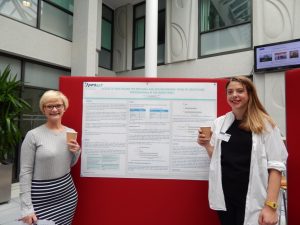
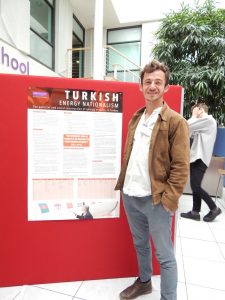
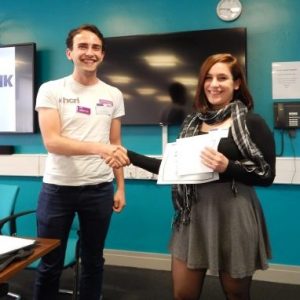
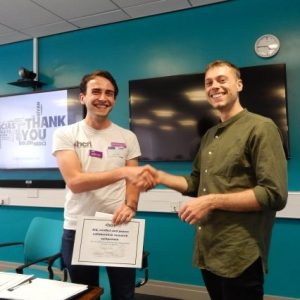

0 Comments